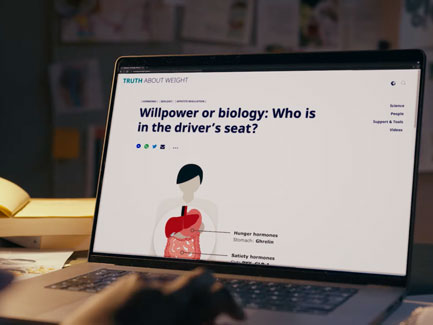Obesity is a disease and there are over 157 million children and
teenagers living with it around the world. Despite this, a history of
misunderstanding across society has caused many teenagers to not
understand their own condition, the causes and how to get support,
which can feel isolating.
It is important for teenagers who live with obesity to understand
there may be more behind their weight than just their relationship
with food and exercise. Did you know that between 40-70% of all
obesity is related to genetics? This means that many teenagers living
with obesity have inherited a higher chance of developing this disease
during their lifetime.
How can genes affect someone’s weight? Genes can influence:
- How much food is consumed in a sitting
- How someone
responds to the sensation of fullness
- How much enjoyment is
received from certain types of food
- How much energy is
needed to run a body’s basic functions
- How and where excess
calories are stored as fat in a body
We now know that these things might have less to do with our
personalities and lifestyle choices and more to do with our genes.
If you would like to know more about how genetics contribute to your
weight, you can read our article ‘Is obesity genetic?’ here.
Additionally, if you would like to find out about how your hormones
affect your weight, you can read our articles ‘How hormones steer
our appetite and eating behaviour’ here.
It is the responsibility of a healthcare professional to help
teenagers to manage their health and to recommend the best treatment
options. These may include a variety of methods, from lifestyle
changes through to medical treatment. Finding a solution to help
manage obesity is not simple and may take multiple visits
to healthcare professional to work out the right way to proceed.
Teenagers may feel nervous about speaking to a healthcare
professional. Some may benefit from discussing their feelings or
concerns with a parent or caregiver first, who also may have
experienced obesity themselves. Some teenagers may find that their
friends and family can provide helpful support when taking the first
steps towards managing their own weight.
If you are ready, reach out to a healthcare professional for support.
Below are some simple steps to help you talk to your healthcare
professional about your weight:
Step 1
- reach out to your local healthcare professional to book an
appointment – you may want to ask your parent or guardian to do this
for you
Step 2
- Your healthcare professional may ask what your day-to-day
routine looks like, so a couple of weeks before your appointment
make a note of your day, including any activities you are involved
in, and what you eat
- This will help you explain to
your healthcare professional about your lifestyle and will also help
your doctor recommend the best approach for you
- The
conversation with your healthcare professional should be balanced
and in no way imply any blame
Step 3
- Make sure you feel comfortable discussing your weight with
your healthcare professional. In some countries, you might have a
short appointment time so don’t be disheartened if you don’t get to
talk about everything immediately
- Try to identify the key
priorities or main points that you want to discuss and take a note
of them with you, so you don’t forget once in the clinic
Step 4
- Persevere! If you leave the appointment feeling dissatisfied,
do not give up. There will be other healthcare professionals ready
to help you. If you need additional support, there are many patient
organisations who can provide this, some have been listed below
ICPO
Irish Coalition for People Living with Obesity
Obesity Action
Coalition
For further information about obesity, please explore the rest of
this site, where you will find useful articles and resources.







